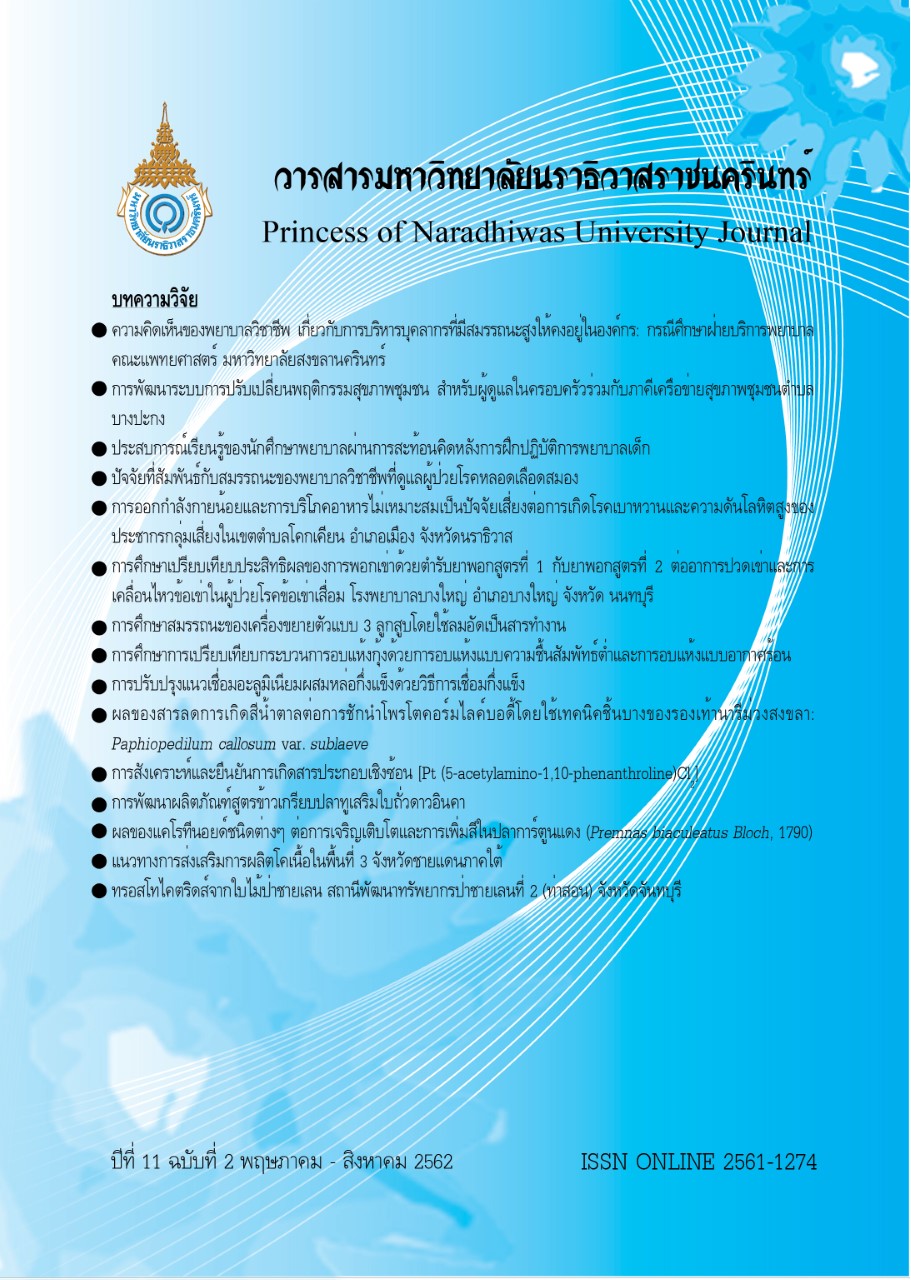ผลของโปรแกรมการมีส่วนร่วมของบิดามารดาในการดูแลเด็กป่วย ต่อความวิตกกังวล และบทบาทของบิดามารดา ในหออภิบาลผู้ป่วยเด็ก
คำสำคัญ:
ความวิตกกังวล, โปรแกรมการมีส่วนร่วมของบิดามารดา, บทบาทของบิดามารดา, หออภิบาลผู้ป่วยเด็กบทคัดย่อ
การวิจัยครั้งนี้เป็นการวิจัยกึ่งทดลอง แบบสองกลุ่ม วัดก่อนและหลังการทดลอง มีวัตถุประสงค์ เพื่อศึกษาผลของ
โปรแกรมการมีส่วนร่วมของบิดามารดาในการดูแลเด็กป่วยต่อความวิตกกังวล และบทบาทของบิดามารดาในหออภิบาลผู้ป่วยเด็ก
กลุ่มตัวอย่าง คือ บิดามารดาของเด็กป่วยที่มีอายุ 1 เดือน ถึง 15 ปี ที่ได้รับการใส่ท่อช่วยหายใจ และใช้เครื่องช่วยหายใจ เข้า
รับการรักษาในหออภิบาลผู้ป่วยเด็ก โรงพยาบาลสงขลานครินทร์ ระหว่างเดือน ตุลาคม พ.ศ. 2559 ถึงเดือน เมษายน พ.ศ. 2560
จำานวน 50 ราย แบ่งเป็นกลุ่มทดลอง 25 ราย และกลุ่มควบคุม 25 ราย กลุ่มทดลองได้รับข้อมูลตามโปรแกรมการมีส่วนร่วม
ของบิดามารดาในการดูแลเด็กป่วย ส่วนกลุ่มควบคุมได้รับข้อมูลตามปกติ เก็บรวบรวมข้อมูลโดยใช้แบบสอบถามความวิตก
กังวลขณะเผชิญของบิดามารดา และแบบสอบถามบทบาทของบิดามารดาในการดูแลเด็กป่วย ซึ่งเครื่องมือทั้งหมดได้ผ่านการ
ประเมินความตรงเชิงเนื้อหาจากผู้ทรงคุณวุฒิจำานวน 3 ท่าน มีค่าความเที่ยงโดยหาค่าสัมประสิทธิ์แอลฟาของครอนบาคได้ .85
และ .82 ตามลำาดับ วิเคราะห์ข้อมูลด้วยสถิติการทดสอบที และการวิเคราะห์ความแปรปรวนร่วมโดยใช้คะแนนความวิตกกังวล
ก่อนการทดลองเป็นตัวแปรร่วม
ผลการวิจัย คะแนนความวิตกกังวลของบิดามารดากลุ่มทดลอง หลังจากที่เด็กป่วยเข้ารับการรักษา 48 ชั่วโมง ต่ำา
กว่ากลุ่มควบคุมอย่างมีนัยสำาคัญทางสถิติ (p < .01) คะแนนบทบาทของบิดามารดาในการดูแลเด็กป่วยของกลุ่มทดลองหลัง
จากที่เด็กป่วยเข้ารับการรักษา 72 ชั่วโมง สูงกว่ากลุ่มควบคุมอย่างมีนัยสำาคัญทางสถิติ (p < .01) จากการวิจัยครั้งนี้ มีข้อเสนอ
แนะว่า การใช้โปรแกรมการมีส่วนร่วมของบิดามารดาในการดูแลเด็กป่วย สามารถช่วยลดความวิตกกังวล และเพิ่มบทบาทของ
บิดามารดาในการดูแลเด็กป่วย ในหออภิบาลผู้ป่วยเด็กได้ จึงควรสนับสนุนให้มีการนำาวิธีการนี้มาใช้ในการพยาบาลอย่างต่อเนื่อง
เอกสารอ้างอิง
Aksornsri, A., Thampanichawat, W., & Wichiencharoen, K. (2012). Effects of concrete objective information on parental anxiety and parental paticipation in care for children in pediatric intensive care unit. Journal of Nursing Science, 30(2), 80- 89.
Asumpinzup, U. (2001). The parental role in caring for children with congenital heart disease. Thai Journal of Pediatrics, 1(2), 6-11.
Chanwatana, B., Jintanadilok, N., Apanakapan, P., Chalamket, W., & Melnyk B.M. (2001). Effect of information intervention on mather’sanxiety level during their children’hospitalization. Thai Journal of Pediatric Nursing, 1(2), 26-36.
Cohen, J. (1988). Statistical power analysis for the behavioral sciences (2nd ed.). HillS.D.ale, New Jersey: Lawrence Erlbaum.
Curley, MA.Q., & Mayer E.C. (2001). Caring Practices:The impact of the critical Care Experience on the family. In Curley MA.Q and Moloney-Harmon PA. Critical care nursing of Infants and Children. Philadelphia: W.B.Saunders Company.
Isarachot, N. (2014). The Effect of a Maternal Participation in Child Care Program on Maternal Stressor at a Pediatric Intensive Care Unit. Master thesis. Prince of Songkla University. (in Thai)
Kapan, K. (2009). Parent, participation in Care for Children in intensive care unit and Factors Associate. Master thesis Chiang mai University. (in Thai)
Karen, S.P., & Jeffrey, S.R. (1999). Family presence during invasive procedures in the pediatric intensive care unit. Archives of Pediatric & Adolescent Medicine, 153, 955-958.
Keawvichit, N., & Thajeen, K. (2007). Knowledge and the parental role in caring for children with heart disease. Songklanagarind Medical Journal, 25(4) 273-282
Lam, L.W., Chang, A.M., & Morrissey. (2006). Parents’experience of participation in the care of hospitalized children: A qualitative study. International Journal of Nursing Studies, 43(5), 535-545.
Marlow, D.R., & Redding, B.A. (1988). Pediatric nursing. Philadelphia:W.B. Saunder
Medical Record of Songklanagarind Hospital. (2014). Statistic of patient admit in intensive care unit songklanagarind hospital. Songkla:Songklanagarindhospital. (in Thai)
Melnyk, B.M. (1995). Parental coping with childhood hospitalization:A theoretical framework to guide research and clinical intervention. Maternal-child nursing journal, 23(4), 123-131.
Maliloon, P., Rutchanagul, P., & Muensa, W. (2016). Impact of a self care development programme for school age thalassaemic children and their caregivers, ability on the children,s self care behaviour. Thai journal of nursing council, 31(2), 52-68.
Rattanapibun, K., Kongsaktrakul, C., & Patoomwan, A. (2011). Parent Participation in the Care of Hospitalized Children. Ramathibodi Nursing Journal, 17(2), 232-247.
Singkla, P. (2007). Effects of nursing mutual participation of mothers on maternal stress and role in caring for critical premature babies [master thesis]. Khon Kaen: Khon Kaen University. (in Thai).
Schepp, K. (1995). Psychometric assessment of the preferred participatation scale for parent of hospitaled children. Unpublished manuscript: University of Washington, School of Nursing, Seattle,WA.
Speilberger, C.D., Gorsuch, R.L., & Lushene, R.E. (1970). STAI manual. California: Consulting Psychologists Press, 20-21.
Vaicheta, S., Chaisirimongkullab, T., & Pookboonmee R. (2008). Advanced pediatric critical care nursing. Bangkok: Mahidol University




